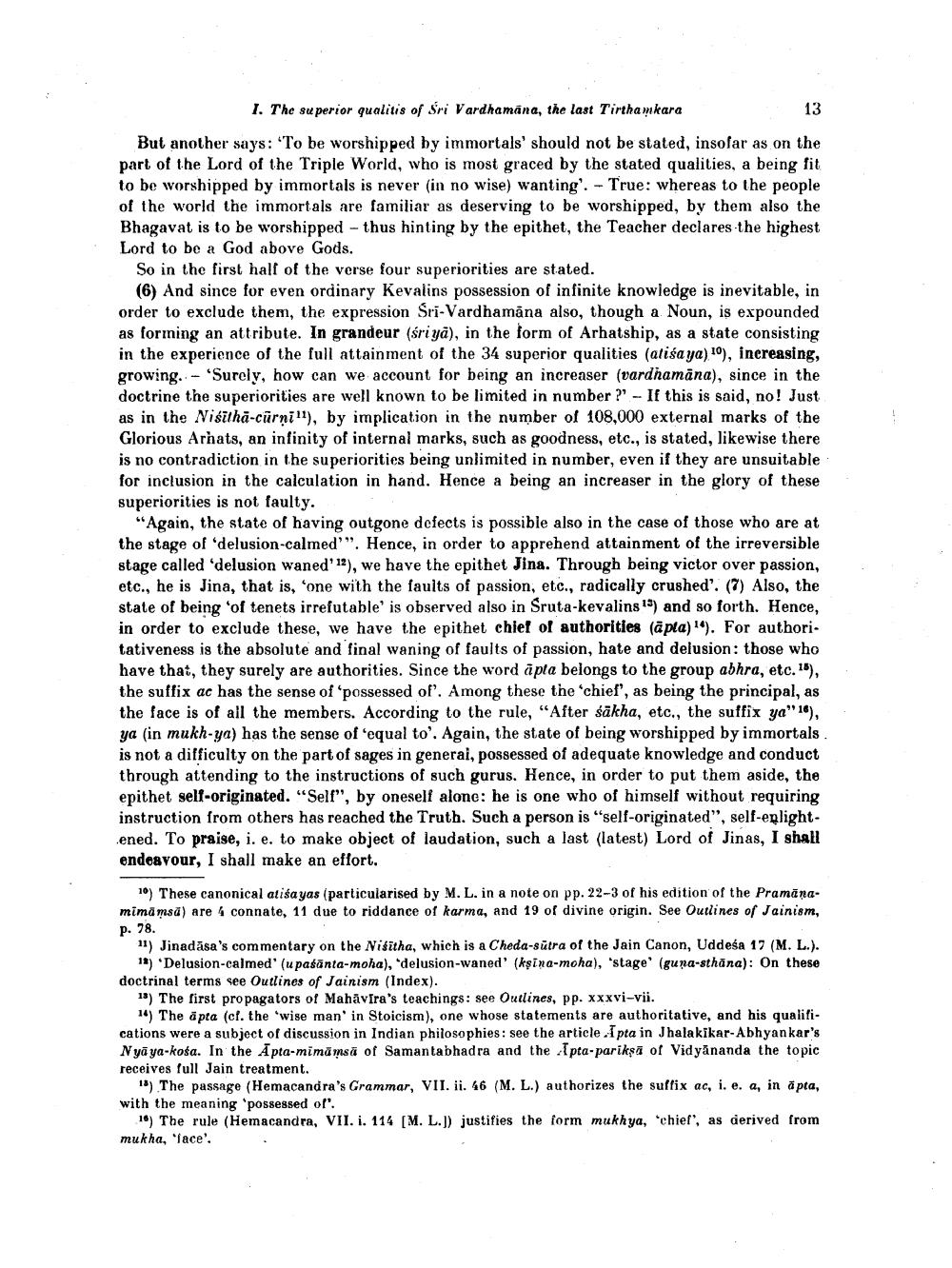________________
I. The superior qualitis of Sri Vardhamana, the last Tirthankara
13
But another says: 'To be worshipped by immortals' should not be stated, insofar as on the part of the Lord of the Triple World, who is most graced by the stated qualities, a being fit to be worshipped by immortals is never (in no wise) wanting'. - True: whereas to the people of the world the immortals are familiar as deserving to be worshipped, by them also the Bhagavat is to be worshipped thus hinting by the epithet, the Teacher declares the highest Lord to be a God above Gods.
So in the first half of the verse four superiorities are stated.
(6) And since for even ordinary Kevalins possession of infinite knowledge is inevitable, in order to exclude them, the expression Sri-Vardhamana also, though a Noun, is expounded as forming an attribute. In grandeur (śriya), in the form of Arhatship, as a state consisting in the experience of the full attainment of the 34 superior qualities (atisaya) 10), increasing, growing. Surely, how can we account for being an increaser (vardhamāna), since in the doctrine the superiorities are well known to be limited in number?" - If this is said, no! Just as in the Nisitha-curņi"), by implication in the number of 108,000 external marks of the Glorious Arhats, an infinity of internal marks, such as goodness, etc., is stated, likewise there is no contradiction in the superiorities being unlimited in number, even if they are unsuitable for inclusion in the calculation in hand. Hence a being an increaser in the glory of these superiorities is not faulty.
"Again, the state of having outgone defects is possible also in the case of those who are at the stage of 'delusion-calmed"". Hence, in order to apprehend attainment of the irreversible stage called 'delusion waned' 12), we have the epithet Jina. Through being victor over passion, etc., he is Jina, that is, 'one with the faults of passion, etc., radically crushed'. (7) Also, the state of being 'of tenets irrefutable' is observed also in Śruta-kevalins 1) and so forth. Hence, in order to exclude these, we have the epithet chief of authorities (apta) 14). For authori tativeness is the absolute and final waning of faults of passion, hate and delusion: those who have that, they surely are authorities. Since the word apta belongs to the group abhra, etc. 15), the suffix ac has the sense of 'possessed of'. Among these the 'chief', as being the principal, as the face is of all the members. According to the rule, "After säkha, etc., the suffix ya" 16), ya (in mukh-ya) has the sense of 'equal to'. Again, the state of being worshipped by immortals. is not a difficulty on the part of sages in general, possessed of adequate knowledge and conduct through attending to the instructions of such gurus. Hence, in order to put them aside, the epithet self-originated. "Self", by oneself alone: he is one who of himself without requiring instruction from others has reached the Truth. Such a person is "self-originated", self-enlightened. To praise, i. e. to make object of laudation, such a last (latest) Lord of Jinas, I shall endeavour, I shall make an effort.
10) These canonical atisayas (particularised by M. L. in a note on pp. 22-3 of his edition of the Pramanamīmāmsā) are 4 connate, 11 due to riddance of karma, and 19 of divine origin. See Outlines of Jainism, p. 78.
11) Jinadasa's commentary on the Nisitha, which is a Cheda-sutra of the Jain Canon, Uddeśa 17 (M. L.). 1) Delusion-calmed' (u pasanta-moha), delusion-waned' (kṣina-moha), 'stage' (guna-sthāna): On these doctrinal terms see Outlines of Jainism (Index).
13) The first propagators of Mahavira's teachings: see Outlines, pp. xxxvi-vii.
14) The apta (cf. the 'wise man' in Stoicism), one whose statements are authoritative, and his qualifications were a subject of discussion in Indian philosophies: see the article Ipta in Jhalakikar-Abhyankar's Nyaya-kosa. In the Apta-mimamsa of Samantabhadra and the Ipta-pariksa of Vidyananda the topic receives full Jain treatment.
1) The passage (Hemacandra's Grammar, VII. ii. 46 (M. L.) authorizes the suffix ac, i. e. a, in apta, with the meaning 'possessed of'.
16) The rule (Hemacandra, VII. i. 114 [M. L.]) justifies the form mukhya, 'chief', as derived from mukha, 'face'.




